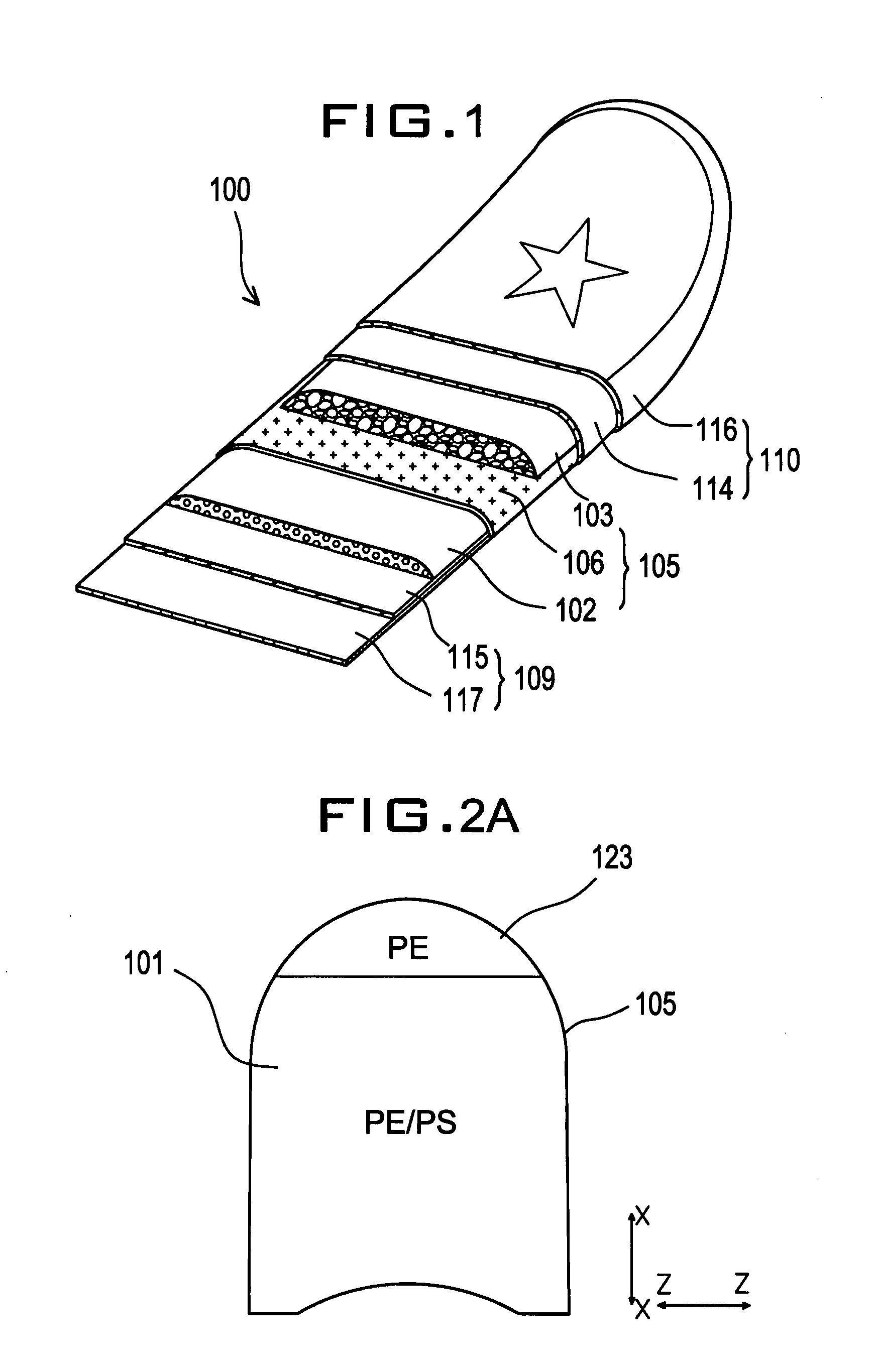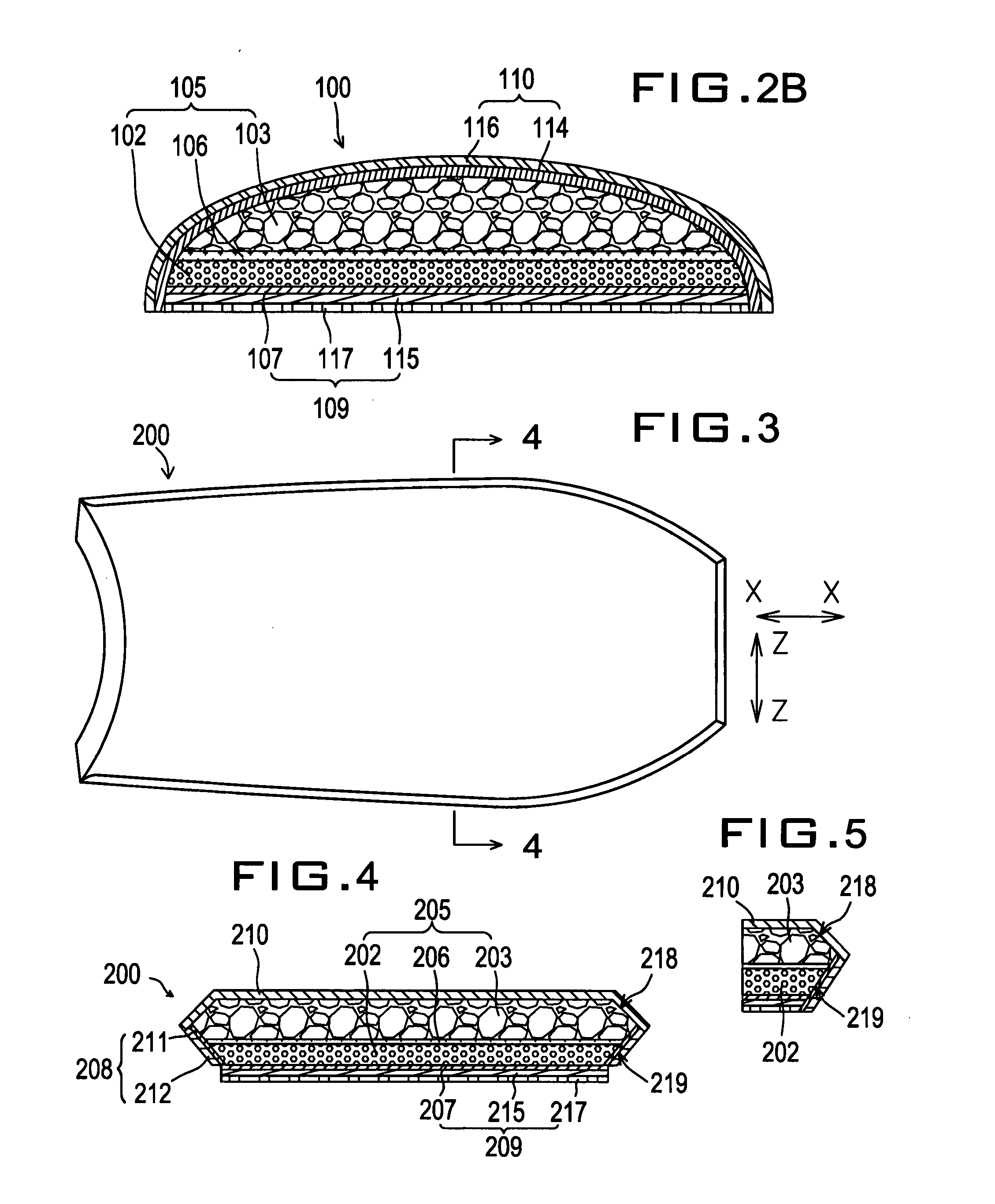Sports board with integral laminated stiffening element
a technology of laminated stiffening elements and sports boards, applied in the field of sports boards, can solve the problems of reducing the sliding speed and directional stability, reducing the maneuverability of sports boards, and achieving the effects of high compression resistance and flexural strength, full frontal flexibility, and even stiffness of boards
- Summary
- Abstract
- Description
- Claims
- Application Information
AI Technical Summary
Benefits of technology
Problems solved by technology
Method used
Image
Examples
first embodiment
[0048] Similar to the first embodiment, a front section 223 also called a nose 223 may be made out of the same blank material as the low density polyethylene foam plate 203 and bonded to the front end of the laminate foam complex 205 to allow greater nose flexibility for improved maneuvering and greater directional control by the rider. The front of nose section 223 is shown as a polyethylene core in FIG. 6. The front nose section may be bonded by adhesive or thermal lamination to the body of the board which is the laminate foam complex 205.
[0049] Alternatively, the stiffening elements 202 may extend throughout the length of the foam core assembly 201 to provide a higher and even stiffness to the entire length of the bodyboard 200. The stiffening element such as the polystyrene foam layer 202 provides greater stiffness as shown in FIG. 7.
[0050] The deck layer 210 and lower rail layer 212 are both polyethylene foam. They have a thickness in the range of 2 to 8 mm and preferably of a...
third embodiment
[0052] A cross-section is shown in FIG. 9 showing the different layers of the The outer film 318 preferably has a density of 0.91 to 0.98 grams per cubic centimeter with a best mode of 0.95 grams per cubic centimeter. The outer film thickness is preferably between 0.02 and 0.15 mm, with a best mode of 0.07 mm. The inner film 319 has a similar density as the outer film and has a thickness preferably between 0.01 and 0.15 mm, with a best mode of 0.07 mm. The polyethylene foam sheet 303 is preferably between 5 and 45 mm, with a best mode of 14 mm and the polystyrene foam sheet is preferably between 3 and 15 mm, with a best mode of 5 mm. Again, an adhesive resin central binding layer 106 preferably binds the polyethylene foam section 403 to the polystyrene foam section 402.
[0053] The third embodiment can be further modified by reversing the orientation of the sheets. The top plastic skin as shown in FIG. 10 over lies the polyethylene foam sheet which overlies a stiffening element polys...
PUM
| Property | Measurement | Unit |
|---|---|---|
| thickness | aaaaa | aaaaa |
| thickness | aaaaa | aaaaa |
| thickness | aaaaa | aaaaa |
Abstract
Description
Claims
Application Information
 Login to View More
Login to View More - R&D
- Intellectual Property
- Life Sciences
- Materials
- Tech Scout
- Unparalleled Data Quality
- Higher Quality Content
- 60% Fewer Hallucinations
Browse by: Latest US Patents, China's latest patents, Technical Efficacy Thesaurus, Application Domain, Technology Topic, Popular Technical Reports.
© 2025 PatSnap. All rights reserved.Legal|Privacy policy|Modern Slavery Act Transparency Statement|Sitemap|About US| Contact US: help@patsnap.com



